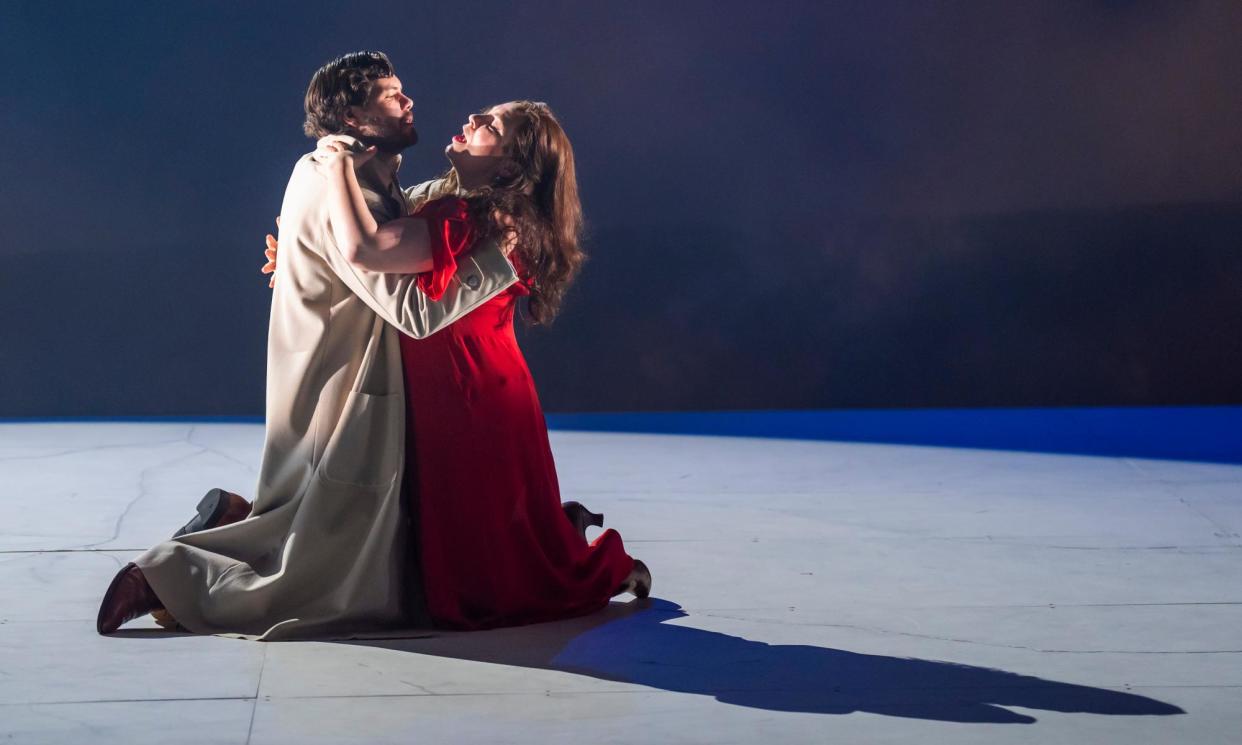Katya Kabanova review – Romaniw soars in cogent take on Janáček’s tragedy

Only a generation ago Janáček’s operas were outsiders, regarded as spiky and hard to place. Now they are so much part of the repertoire that they are regularly served up between the champagne and interval picnics of the country house opera circuit. Grange Park Opera’s latest Janáček production, in the theatre in the grounds of West Horsley Place – which fans of the TV series Ghosts will recognise as Button House – reunites some big names for his 1921 opera, supporting a powerhouse role debut from the Welsh soprano Natalya Romaniw.
The director is David Alden, almost fresh from reviving Janáček’s Jenufa at ENO and here revisiting a work he first staged more than a quarter of a century ago. His familiar fingerprints are all over it. Apart from some chaotic moments as Katya’s world unravels in the final act the action is staged simply and allusively on Hannah Postlethwaite’s sloping slab of a set, with Tim Mitchell’s lighting creating silhouettes that seem almost like characters in their own right. The era is vaguely Janáček’s own, the setting dour and almost plain apart from a door marked Vychod, “exit”, at the back. In the storm, whipped up by chorus members brandishing umbrellas, the ruined building in which everyone shelters is unambiguously an abandoned church, the chorus witness Katya’s self-inflicted downfall as a stony-faced congregation.
Gabrielle Dalton’s costumes make Katya initially sepia-toned, as though all her colour has been leached away; when she first slips out to meet Boris, in a red dress with her hair down, it’s as if she’s already condemned herself as a scarlet woman. Boris’s pale suit and coat is destined to remain squeaky clean: there’s a feeling of predetermination here that perhaps irons out some of the work’s complexities, but those remain in the music, which glows as conducted by Stephen Barlow, even if it could sometimes use a little more muscle in the violins.
Even given high expectations, Romaniw doesn’t disappoint: her soprano is gloriously full-bodied, incisive enough to soar over the orchestra, and she acts the role as touchingly as she sings. As in Janáček’s Jenufa here in 2017, she is paired with Susan Bullock, who is chilling in the clipped phrases of Kabanicha, the monstrous mother-in-law; she’s almost equalled in grotesquerie by Clive Bayley’s doddery Dikoj, picking his way across the stage with his stick like a giant spider. Trailing in Kabanicha’s wake, Tichon is an older mummy’s boy than usual, making the dynamic here seem even more hopeless. He’s sung by Adrian Thompson, one of three clarion tenors alongside Thomas Atkins’s persuasive Boris and Benjamin Hulett’s energetic Kudrjas. But it’s Katie Bray’s thoroughly modern Varvara who really shines among the supporting cast, singing radiantly and showing us poignantly the kind of woman Katya could have been.
• At Grange Park Opera, Surrey, until 12 July.

 Yahoo News
Yahoo News 
